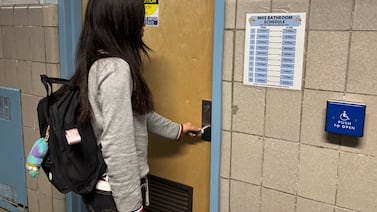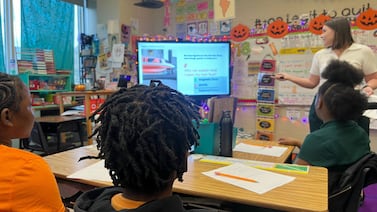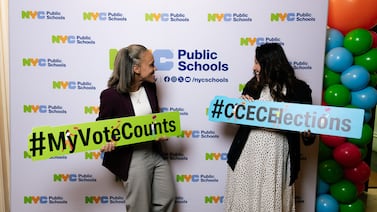Sign up for Chalkbeat Indiana’s free daily newsletter to keep up with Indianapolis Public Schools, Marion County’s township districts, and statewide education news.
A proposal to allow school board candidates in Indiana to declare a party affiliation is heading for the governor’s desk after some uncertainty about the final language of the bill.
Under changes approved by the House, Senate Bill 287 allows school board candidates to state a party affiliation, identify as independent, or remain nonpartisan in general elections. In Indiana, school board elections are currently nonpartisan.
But lawmakers have tried to change that for several years amidst increased tensions over COVID-related school closures and mask and vaccine policies, as well as subsequent fights over curriculum and teaching.
Up until now, the idea has failed. The proposals have faced significant opposition from educators and advocates who expressed concern that partisan politics would detract from a school board’s primary duties to choose a superintendent, approve a budget, and set policies.
But supporters of the bill this year said politics already influence how schools operate, and that allowing candidates to declare a party would provide more information about their values to voters. Some lawmakers supported the idea that the bill would help more conservative candidates win school board seats.
The bill allows county parties to challenge candidates’ stated affiliation if they did not vote in that party’s two most recent primary elections, or obtain written certification from the county party chairman that they are a member of the party.
It also provides raises to school board members to an amount not more than 10% of the lowest starting salary of a teacher in that school district. That salary is currently set at $2,000.
Initially, the bill as passed by the Senate would have required candidates to state an affiliation and go through the primary election process, just like other candidates.
Senate lawmakers initially planned to agree with the House’s changes. But that concurrence was withdrawn, and the bill was sent to a conference committee, which is tasked with finding a compromise between the two versions.
The conference committee briefly met Monday and discussed reverting the bill to its Senate version. But on Tuesday, lawmakers appear to have changed their minds again, filing another concurrence on the bill as passed by the House. The concurrence prevailed on Thursday.
It’s not clear what lawmakers disagreed on, nor how the dispute was resolved.
Republican Sen. Gary Byrne, the bill’s author, did not immediately return a request for comment.
The bill is now on its way to the desk of Gov. Mike Braun. If Braun signs it, it would take effect in July. However, there are no school board elections in Indiana this year.
Aleksandra Appleton covers Indiana education policy and writes about K-12 schools across the state. Contact her at aappleton@chalkbeat.org.





